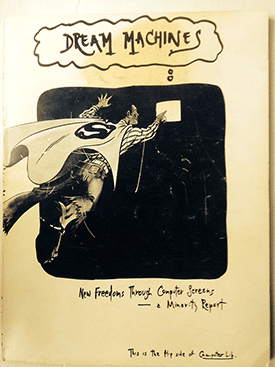Authenticity, Digital Worlds, and Video Gaming
Among the newest program units to be inducted into the AAR Annual Meeting program is the Video Gaming and Religion Seminar. In this interview, which has been transcribed and edited, seminar cochair Gregory Price Grieve talks about the origins of digital media, the field's legitimacy in the study of religion, and the complicated questions that our digital selves and networks pose to traditional definitions of identity, religion, ritual, and play. The seminar's Annual Meeting session, "Crafting the Study of Religion and Video Games: A Roundtable Discussion of Key Perspectives" will be on Monday, November 23, 9:00–11:30 am in the Hilton, room 206.
Sarah Levine: One of the points made in introductory texts about video gaming and religion is that religious studies tends not to take video game play seriously. In the introduction to Playing with Religion in Digital Games, you and coeditor Heidi Campbell cite some attitudes that contribute to the field’s neglect: games aren’t considered serious; they aren’t real forms of expression or art; tech and digital media is widely seen as secular; and virtual worlds aren’t real.
Gregory Grieve: The study of religion and video games is really really recent. Realistically, it probably starts in 2007 at AAR [editor’s note: See 2007 Annual Meetings Program Book, session A17-121, “Born Digital and Born Again Digital: Religions in Virtual Gaming Worlds”]. The question of legitimacy was an important early one, but I think we're past that now. We've at least proven it to ourselves, and we've gotten enough people involved that we have our own mini-subfield. Interestingly, this was about the same time that the Supreme Court decided that video games were protected by the freedom of speech in 2011.
| I just want to thank Kristen Radde-Antweiler and Xenia Zeller because they should be a part of the conversation, but because of their schedules they couldn't be here, so I just want to thank them for doing a lot of the grunt work for this. And I also want to thank the rest of the steering committee, Christopher Helland, Heidi Campbell, and Rachel Wagner. While I'm doing the interview, I'm thinking about all of them. Also, this last spring in Helsinki, we started the ISGAR (International Academy for the Study of Gaming and Religion). |
When people talk about video games being real or not real, what are they talking about? I think a better word than real is probably “authentic.” Authentic seems to mean three things: It is a good copy of something taking place in the actual world, and there's face-to-face nonmediated human communication going on. The third notion of authentic, which for me is the most interesting because it is tied the closest to religion, is the existential notion of it—is playing video games somehow helping you as a human being to find out the deeper questions in life? All three of those are entangled with the notion of the real.
But scholars of religion do engage other gameplay pretty seriously: the ancient Olympics and the pre-Columbian Mesoamerican ballgames come to mind. What is it about the digital component that keeps scholars from embracing video gaming the way they have other forms of games and religion?
Video games are an inseparable part of global culture. Most people spend more time playing video games then reading books or even watching films. So why weren’t religious scholars taking video games seriously? Why were they ignoring them? I think some of it has to do with the history of religious studies itself and where it comes from as a field. Religious studies is a liberal protestant interpretation of scripture—that's where it comes from—and video games just don't fit well into those categories. And the reason they don't fit well has to do with play, and knowing play is not serious. But if you were a Martian and you came down and were watching someone play a game and watching someone perform a religious ritual, and you didn't have the insider's point of view, you wouldn't know which was which. So I think scholars of religion are a little sheepish about play because it looks a little too much like religion.
There's a similar sheepishness that has to do with popular culture. I'm not sure if popular culture is a really good term, but it's the one we have. If you imagine a cultural food chain with cathedrals and operas at the top, video games would be down near the bottom, maybe just above pornography. Humanities scholars are reluctant to talk about things low on the totem pole of popular culture, and religious studies is no different. So I think that's another reason.
I think a third reason is a general notion in American culture that video games cause violence. You see this with Columbine: Did they blame bullying, did they blame guns? No, they blamed video games. But that wasn't even the first time. If you look all the way back to when video games hit the mainstream in the mid-70s, you had this game called DeathRace 2000 which was based on the movie of the same name, and again, there was the same public outcry about it.
 Poster advertisement for Death Race, a 1976 arcade game inspired by the cult film Death Race 2000. Via Wikipedia.
Poster advertisement for Death Race, a 1976 arcade game inspired by the cult film Death Race 2000. Via Wikipedia.We have a video game lab in the library now, and I was having the consul games catalogued by the librarian so that students could come check them out. One of the librarians refused to catalogue Skyrim because it was violent. Usually I’m pretty cool-headed but I kind of sniped back and said, "Have you read the Bible?!" Somehow violence in film, violence in books, violence in scripture is fine, but violence in video games causes people to have these moral dilemmas.
The field is a lot more complicated than I initially thought. Game developers often build myths and religious topoi into games, sometimes for didactic reasons. Some require a level of religious and historical literacy for the game to make sense. But there’s also a lot going on between the game and the player(s), too—questions of self-representation and identity- and community-building. That’s not even getting to the economic conditions and the questions of designers’ intent in game development. If you would, break down some of the main questions are scholars in this field trying to answer. Where do they overlap with more traditional studies of religion, and what lines of inquiry are being forged?
GG: I come from a Post-J. Z. Smith notion of what religion is, so I don't think that there's anything inherently religious, and I don't think there's a monolithic thing which is “religion.” The category of religion, however, is not solely the creation of the scholar. What counts as religion ought to emerge from a dialogue between the emic use by the inside practitioner, and the etic theorizing of the outside investigator. When I think about video games, I think about them really broadly in two ways: either the in-game use of religion or how players use video games for religious purposes in their daily lives.
I usually think about [the in-game uses of religion] on three levels, which are identified by Vít Šisler in the book that Heidi [Campbell] and I wrote [Playing with Religion in Digital Games]. He talks about a narrative level, an audiovisual level, and a procedural level.
The narrative level is the lore and mythology that goes into the game, and from the start, video games have used a lot mythological lore to justify why the game is happening. If you look at video game like Skyrim, for example, the narrative level would include something like Azura the Black Star. Azura is the goddess of dusk and dawn and she's one of the good Daedric deities. So that would be the mythological or narrative level.
The audiovisual level would be how the game actually appears on the screen. So you can imagine [Azura’s] shrine, her voice when she talks, different interactions.
The third level, one which is unique to the media of video games compared to film or books, is the procedural level. It’s the interactivity that you get with the game. Unlike a book, I can go and interact with this goddess Azura, and depending on my actions, something different is going to occur. I can either choose to take the quest, go into the star and interact with different minor deities, or I can decide not to and wander back out of the quest. For me, the procedural is the most interesting because it's what's unique to digital media.
Then there's what's outside of the game, and how people use the game for religious purposes in their everyday life. I break this down into two major categories. One I would call the institutional use of religion—so this would be the use of video gaming by mainstream institutions like the Catholic Church, let's say. An example would be a really famous game from the early 90s, Bible Builder. Basically it was a little PC game, and you would answer some questions about the Bible and then you'd get some type of little visual reward for doing that, like a little dancing bear or something like that.
 Screenshot from Bible Builder (1992). The game is still available for online play.
Screenshot from Bible Builder (1992). The game is still available for online play.There are also some games where the designers aim for spiritual qualities. Take a look at Journey, a game from 2012. In it, you're a pilgrim who is trying to get to the top of this mountain, and along the way you interact with different people while having this spiritual quest.
Some people use mainstream games for theological reasons, too. There's this great website called Hardcore Christian Gamer, and it’s made up of hardcore Christians who are also hardcore gamers. There's a lot of ethical discussion about how to play the games, and it's really interesting to see how they use it for their own religious practice. Shanny Luft, who's at University of Wisconsin-Stevens Point, writes about that a lot.
SL: That's wild.
GG: Yeah, it's really interesting to read because there's this one game, Call of Duty: Modern Warfare, where there's a scene where you have to go infiltrate a terrorist ring, and to be a part of it you have to kill civilians in an airport. The gamers talk about how to play that from a Christian point of view.
So the games present moral dilemmas for player, ones that they wouldn’t have in “real life.”
Right. It illuminates their moral economies.
How about institutional religions? How have they chosen to interact with video games?
Truthfully, most institutionalized religions have not embraced video games. There’s a Catholic News Service story from January 2013, and it basically argues that good Catholics shouldn't play video games. This was just a couple years ago.
Often, when big institutions do embrace video games, the games themselves are really bad. They don’t take into account the genre; they're just trying to force traditional ways of looking at scripture into a video game. There was this one game the Lutheran Church put out for the 500th year anniversary of Luther nailing the ninety-five theses on the door, and it's not much fun. You just go and nail these things on the door and that's it. There's no interactivity.
But there are some Christian groups out there who are trying really hard to create really good games. There's one I saw in Canterbury about a year ago, it's called David: Rise of a King, and it's just in development now, and it’s the first one that I know about that’s truly interactive.
From a Christian point of view, one of the main reasons that big institutions haven't embraced games as much is because the outcome of the sacred narrative is set. You could imagine if you're playing Christ's Passion, you don’t want to let the players have an option of not having it come out the way that it did—for instance, playing as Christ you could decide not to get crucified. Rachel Wagner writes about this.
Right.
What you end up having instead is the Left Behind series because it’s taking place in the future where the outcome isn't set yet. But you're probably not going to have a game where you get to be Christ and go through the Passion and have all these things happen to you, and you decide "Oh, I'm not going to do that."
Yeah, like "I'm not going to take the cup."
Right. So that's one of the reasons large institutional religions haven't embraced gaming as much. There's a couple Islamic games which are based on the game Age of Empires, and it's interesting because you play one of the pagan Bedouin tribes and you get to decide whether to go with Muhammad or not. Vít Šisler has written about this.
It seems to me that the study of gaming and religion can go in at least two directions: the empirical and the philosophical. In the 90s and early aughts we saw an interrogation the effects of of video game violence on primarily young, impressionable, male players. What did that episode teach us, and do any of those takeaways apply to looking at religion in relation to video games?
You know, I’m not an expert on the empirical data, but I do follow the research, and interestingly, the empirical studies tend to dissolve the myth about video games. There's this myth that it's a lone, disgruntled youth playing in his mother's basement. The studies show it's much more complicated than that. The solo, male, first-person shooter stuff might still be true for people playing on PCs, and there is this kind of PC hardcore gamer ethos that's still out there. You got that with Gamergate, and it exists out there, but it's by far not the majority.
The Entertainment Software Association, which is basically the lobby group for video games, put out all of the statistics for video games every year. The last one they had was for 2014, and those statistics show that 59% of Americans play video games, the average age is thirty-one years old, the genders are almost equal now. The statistics and the empirical studies disprove the myth of the lone gamer.
The empirical stuff's interesting when it dissolves the myths around the games and breaks down prejudice—when they call you to something you wouldn't have recognized. Although for me what's interesting about video games, and the reason I started to study video games is the question they ask about what it means to be human. A lot of the classic modernist notions of what it means to be human are called into question by gaming: What does it mean to be a person? Is your avatar part of you? Where do you as an individual end? What about community? Does community only have to be face-to-face or do communities of people network through video game consoles count as a community? And the thing is, it's not just academics, the gamers themselves ask these questions. It forces them to be philosophers in a sense.
So let's talk more about the philosophical side then. It seems that games force players and scholars alike to engage with the idea that the cosmos—whether it be the "real" space we live in or the world created by the game—is human-generated. So on at least one level, the distinction between the real world and the game world doesn’t seem all that helpful. At the same time, it does feel like a major mental leap.
First of all, let me say that Rachel Wagner in God Wired writes extensively about that, about how video games and religion are similar because they both create worlds. She's done an excellent job of writing about that, and builds off of what Roger Caillois calls “the most daring thesis,” that is “the identification of play and the sacred.”
This question is one people haven’t talk about as much—why people think that video games are somehow separate from actual life? There's no ontological reason for it. But there is a cultural history for why we think about video games the way we do, and this is actually what I'm writing about right now.
It was in the early 1970s Bay Area when video games and digital media come to the fore. What you had at that point are kind of burnt-out ex-hippies, these New Communalists, such as Stewart Brand who went to live in off-grid communities, but who for the most part failed. He's the guy that started the Whole Earth Catalog, which was a catalogue of different things you could buy for your intentional community. He's actually the one that came up with the whole notion of consumer comments. So if you go to Amazon now and you get to write a little review about your purchase, he invented that. If you look at these old Whole Earth catalogues, they look like like webpages but in print.
So you have these New Communalists and you have the hackers of the Homebrew Computer Club—Steve Jobs, Bill Gates—all these guys hanging out together; they're literally across the street from Stewart Brand—and they interact with each other, so digital media takes on this utopic character. Before then, if you looked at what people were publishing about digital media, you’d see something like Theodore Roszak’s 1969 The Making of a Counter Culture, and he basically hated computers. He thought they were evil; they were going to dehumanize people; they were a way of creating a controlling society. But then, just a few years later, you start to get a mixture of these New Communalists and these computer hackers, and they see in digital media a utopic space through which to have these new intentional communities. You get a sense of the genealogy of Google’s slogan “Don’t be evil.”
So then you get someone like Ted Nelson, he has this incredible book which I just love called Computer Lib/Dream Machines and it's a graphic novel which you can read as an intense description of computer hardware, but if you flip it over there's this crazy psychedelic dream about how computers can liberate people.
That's fascinating.
Google it. It's very interesting.
So you get these two strands coming together and meeting almost serendipitously and because of that, digital media has come to be seen as something separate from everyday life and something utopic and different. So I think that's how it came about. Human beings have been using media practices to create virtual worlds all the way back to the Paleolithic caves. You can think of the Paleolithic cave as a virtual world, you can think of a cathedral as a virtual world that's taking you into another cosmos. There's nothing inherent about digital media for creating virtual worlds. I think people like virtual worlds, and there's a cultural-historical background for why digital media came to be looked at the way it did.
Part of me thinks it’s just habituation. When I send a message through Facebook or e-mail, I consider that “normal” communication even though it’s mediated by a device and a network.
People have always been mediated, even by speech. I was always curious about why digital media was looked at the way it was; why it seemed to be different, and I think it’s cultural. You’re asking, “Where’s the rub right now in the field,” and it seems to be in a conversation about cultural shaping, which is Heidi Campbell’s term, versus media determinism.
From the start, video games have been part of the shaping of how we talk about digital media. Like Stewart Brand—after he stopping writing the Whole Earth Catalog, he started to write freelance for Rolling Stone and he wrote an article on Space War, which was one of the first video games, and it takes on the same tone that people are using to write about hallucinogens. He wrote about digital media as a way to expand your conciseness and creating types of intentional communities outside of the mainstream. You see this is the “cyberdelic” movement advanced by the advocates of psychedelic drugs, such as Timothy Leary who compared PCs to LSD, and argues that the one thing that no mass society can stand is individuals that go off to “start learning how to program, reprogram, boot up, activate, and format their own brains.”
This brings me to mind massive multi-player online games. In them, you’re able to interact with people, or at least their avatars, that you otherwise wouldn’t. There may even be language barriers, but the fact that everyone understands how the game should be played and the roles within it allows you to do things together. It allows participation in an Otherworld, perhaps similar to hallucinogenic drugs. You can drop in and out, so to speak.
Digital media has opened up a lot of new ways for human beings to interact. I tend to talk about online communities—I call them cloud communities—as a way of uploading your sociability into this other space, into computers. What’s good about them is that they are easy to enter and easy to leave; what’s bad about them is that they’re easy to enter and easy to leave. Although you may have some long-term commitments with people, there’s not a huge amount of loyalty.
But, you know, I like the role play involved in these games too. I also like to think about what composes a player; there’s really two parts: There’s the user and the avatar, and together they make a unique social being. And then the question becomes, “what are you as a human being?”
And online avatars—from your Wii miis to World of Warcraft avatars let users explore parts of themselves, I imagine.
You’re able to experiment freely and without much risk. I don’t know how you would study it, but all of the fluidity that’s now occurring with gender and race now has to do with people’s experiences. There’s probably not a one-way correlation, it’s back and forth.
If you think about the scholar of religion Walter Ong’s work, your notion of "self" is not something innate or given by God or nature, but it comes about by the media practices that you use. So maybe if you’re using these more fluid media practices, your notion of self is going to change. Online space is more an extension of the real world than a dichotomous break. It’s porous. Cultural shaping versus media determinism: that’s the direction the field seems to be heading at the moment. I probably fall more on the cultural shaping side, but the category of religion also depends on the media practices used to communicate.
What about as technology progresses—what methodological or ethical questions do you think will emerge from advances in AI and virtual realities?
In contemporary society we’re much more conscience of our media practices than most humans have ever been in history because things are changing so rapidly. I grew up without cable and had three television channels. We had a huge modem that you could call into a computer on because my father was a software engineer. I remember coding early on and imagining a game like Skyrim and how great that would seem. If the past is a foreign country in a sense, the present is also a foreign country, too. I think we’re a lot more concerned with technology now than people were in the past because they existed within the same media environment that they were born into.
We think about it a lot more because we’re confronted with it, and it confronts us. As for ethics, Julian Dibble wrote on virtual rape—where characters force other characters to have sex—in LambdaMOO, which is a textual-virtual world. The question becomes whether that behavior is morally wrong, or is that just play?
The same is true with AI. I don’t think we’re there yet, but at some point, there’s going to be a tipping point where we have to consider whether these things which are created in code are sentient creatures. We’re going to be confronted with those types of questions. Virtual rape seems unethical, but murder in a game doesn’t seem unethical. Why is that?
I think you’re right in that we’re not quite there yet, but I also think we will be sooner we’re ethically ready.
There’s a distinction between virtual reality and virtual worlds. Virtual reality has a sensual component that comes in all the time, and digital media problematizes is the body. If you think of the body from a biological point of view, then your avatar is not your body. But if you think of it from a Butlerian point of view, then your avatar is in a sense part of your body, or is a performance of your body. I’m not an ethicist so I tend to ask more ethical questions than provide answers.
Other people have thought about ethics though. In 2011, Pope Benedict issued a message called “Truth, Proclamation, and Authenticity of Life in the Digital Age” regarding how young Catholics should approach their online representations. He believed that authenticity was when your real-life-self matched up with your online representation. So the Catholic Church, along with other groups, has thought about this, particularly in regard to gender and notions of identity.
As a new seminar, Video Gaming and Religion will exist for five years on the AAR program. One of the goals of seminars is that the group has a deliverable after those five years. What is the program unit planning to do with its time?
We are going to do three things. Our main point is to concretize and strengthen the network bonds of people working in the field. We also want to ensure that people who might not know about is the subfield are drawn in. The soft “human” infrastructure is probably the most important outcome.
But we want to publish a volume at the end on methods and approaches to religion and the study of video games, where hopefully all of the main players in the field will be able to publish.
Kirsten [Radde-Antweiler] and Xenia [Zeiler] started a journal called gamenvironments. I’m also going to start a website called Let’s Play with Religion. You’ve heard of Let’s Plays, right?
Sure. [ed. note: YouTube’s #1 subscribed channel belongs to user Pewdiepie, who posts videos of himself playing video games while providing simultaneous commentary. These types of videos or livestreams, where there’s a communal experience of a game through a single-player, are called Let’s Plays.]
My students love to watch other people play with video games. So I want to start a website that uses that genre to talk about religion in video games, and I’m hoping to hit a wider audience.
Felix Arvid Ulf Kjellberg (aka Pewdiepie) plays The Last of Us (language advisory).
What are some ideas on how can religion instructors better integrate digital media and gaming into their already-extant courses?
I’ve been thinking about this. Just as a caveat, the logistics of doing it are difficult unless you have a gaming lab, because otherwise you don’t have the games for the students to play. If you want to show a film, you can throw it up on a screen. Unless you have a gaming lab, to use video games is a huge logistic nightmare. Things people have done, and I have done, is use Minecraft to build sacred architecture; People have used Second Life to talk about identity and identity formation; and people have used mainstream games like Skyrim to talk about notions of neo-Medievalism. I think there’s a lot of different ways to use them, and I’m sure a lot of different ways that I can’t even imagine.
I remember in an art history course in college a professor using a digital world—it wasn’t Minecraft, but it was somewhat similar—to show us a 3D reconstruction of a medieval church in Germany, to give us a better sense of the spatial sense inside the building. He definitely seemed to be pushing us to develop a humanistic or phenomenological sense of the architecture.
Yeah, Minecraft is really good for something like that, and I actually use it to teach about sacred architecture. Video games seem to make the knowledge more sticky, and that’s what students remember and talk to me about years later. Years after the class is over, students will stop me to speak about the class.
Your own research looks at Buddhism in the digital world, and you’ve written book chapters, articles, and now a book, with a specific focus on the success Buddhism has had on the virtual world Second Life. Could you talk a bit about your research and tell me—regardless of what Second Life’s creator says, is the world a game or not and what differentiates a virtual game from a virtual world? Is it a distinction worth making?
Depending on how you cut the cake, I do digital media and I do the gaming stuff, but I also research Buddhism online. I published an edited volume, Buddhism, the Internet, and Digital Media: The Pixel and Lotus, with Daniel Veidlinger, on Buddhism and digital media. It’s actually selling better than the video game book, which surprises me. I think a lot of converts to Buddhism are interested in it.
For about seven years now I’ve been working on Buddhism in Second Life, and I have just sent the manuscript off to be published. It’s tentatively titled Awake Online, and it talks about contemplative practices in Second Life, and should be out in 2016.
 Meditation in Second Life.
Meditation in Second Life.So is it a study of a virtual world or a virtual game? Is there a distinction?
It really depends on how you define “play.” In the field, the dominate way of defining play is through Johan Huinzinga. Do you know his work?
No.
He was a Dutch medievalist who is the father of game studies. He had this notion of the magic circle. For him, games create a magic circle around the game space, and within that game space, there’s a different set of rules than within normal society. For example, in normal world, when you kick a ball into the net, that’s all that happens. But if you’re within the magic space of a soccer game, and you kick the goal into the net, you score a goal. In that sense, Second Life is not a game. But I also like to talk about play through Donald Winnicott, who’s an English children’s psychiatrist. He talks about play more like “playing house”—pretend, and in that sense, Second Life is a game.
It sounds similar to The Sims.
Right. It all depends on how you talk about play. I would say Second Life is a game. If it’s not a game, it’s play, at least.
 In-game wedding ceremony, Second Life. This screenshot was taken by Flickr user raftwetjewel, who provided the accompanying caption:
In-game wedding ceremony, Second Life. This screenshot was taken by Flickr user raftwetjewel, who provided the accompanying caption:SECOND LIFE WEDDING: Weddings are complicated affairs. When, where and what am I going to wear? A wedding is complicated in real life and equally complex in Second Life. An old friend invited me to his best friend's wedding. My friend was the best man and he had never been part of a wedding party. So I went to help support him and get some inspiration for when I get married...Annie and Douglas, a beautiful couple held their nuptials at Rose Gardens. The sim is built for weddings and it is simply elegant. Annie's dress was beautiful and Douglas was elegant in his tuxedo. Morgana Shi was the minister and her words were beautiful spoken and timely for the couple. My friend was best man while Benny was another attendant. Penny and Shila were Annie's bridesmaids. I didn't know anyone there except for my friend, but all welcomed me as part of their special day. I had a lot of fun that afternoon just talking and watching a beautiful event. Yes, a wedding only takes but a few minutes to complete... but over months and months of planning takes place to accomplish that wonderful day. Congratulations to Annie and Douglas and thank you very much for your hospitality!
So, finally, what are your favorite games?
I’ve been gaming for as long as I can remember. The first game I played was Colossal Cave Adventure. Do you know it?
I don’t.
You should Google it. It’s really fun. It has no narrative and has no audiovisual level, but the gameplay is incredible. The next one for me was Asteroids, which was a console game in the early 80s, but then I stopped playing them for a while due to college and grad school. I’ve always been interested in virtual worlds and so I did LambdaMOO, which is a MUD [ed. note: multi-user dungeon], and Second Life, and I’ve written about those.
In a sense, the media caught up with my imagination, and the ability to go into these virtual worlds always fascinated me. Religion has always had virtual worlds, but the difference is when you’re in a virtual world like World of Warcraft, you’re with other people. I still find that “awesome” in Cotton Mather’s sense of the term. It amazes me. I’d like to say I play all of these cool independent games, but I don’t. I’m more interested in how popular culture uses games, than seeking out the cutting edge. I’ve been playing Skyrim, Minecraft, and as I finished up my book way too much Civilization V recently with Chris Helland.
 Gregory Price Grieve is associate professor and head of the Department of Religious Studies at the University of North Carolina at Greensboro. He researches and teaches at the intersection of digital media, Buddhism and the theories and methods for the study of religion. Author of numerous monographs, edited volumes, journal articles, and book chapters, Grieve’s work investigates the role popular forms of religion play in determining what it means to be human in the digital age. The main body of his research concerns everyday religious practice, particularly Buddhist practices, but also those related to Hinduism, Christianity, and neo-Paganism. Grieve has been immensely influential in the field of religion and digital humanities, not only through his own work, but also through his various editorial roles for leading publications including serving as series editor for Routledge’s “Studies in Religion and Digital Culture” and De Gruyter’s series “Digital Humanities and Religion.” In addition, he holds leadership positions in both the Religion and Video Games and Religion, Media, and Culture groups of the AAR, the leading professional organization in religious studies. He is also a founding member of the International Academy for the Study of Religion and Digital Games (Finland).
Gregory Price Grieve is associate professor and head of the Department of Religious Studies at the University of North Carolina at Greensboro. He researches and teaches at the intersection of digital media, Buddhism and the theories and methods for the study of religion. Author of numerous monographs, edited volumes, journal articles, and book chapters, Grieve’s work investigates the role popular forms of religion play in determining what it means to be human in the digital age. The main body of his research concerns everyday religious practice, particularly Buddhist practices, but also those related to Hinduism, Christianity, and neo-Paganism. Grieve has been immensely influential in the field of religion and digital humanities, not only through his own work, but also through his various editorial roles for leading publications including serving as series editor for Routledge’s “Studies in Religion and Digital Culture” and De Gruyter’s series “Digital Humanities and Religion.” In addition, he holds leadership positions in both the Religion and Video Games and Religion, Media, and Culture groups of the AAR, the leading professional organization in religious studies. He is also a founding member of the International Academy for the Study of Religion and Digital Games (Finland).











